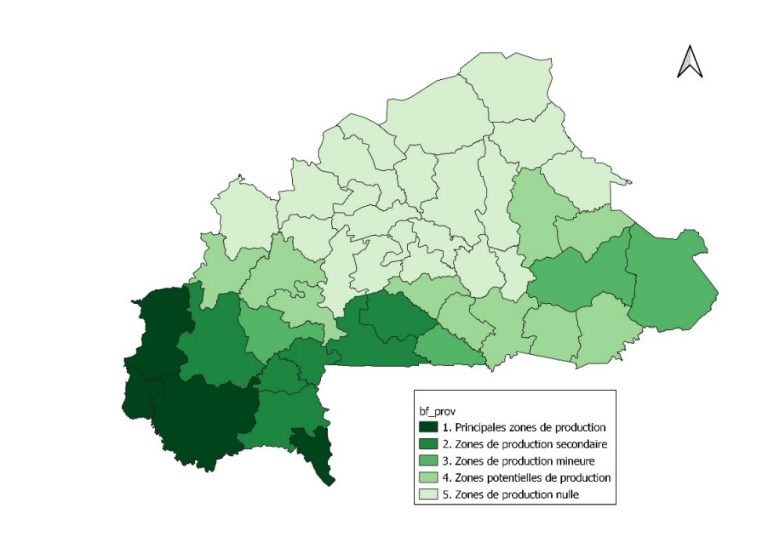Burkina Faso is a signatory member of the CICC Constitutive Convention on November 16, 2016 in Abidjan, through Mr. Sibiri SANOU, Secretary General of the Ministry of Commerce, Industry and Crafts of Burkina Faso. Burkina Faso held the presidency of the Institution from December 2019 to December 2021, through Mr. Harouna KABORE, Minister of Commerce, Industry and Crafts of the country.
Currently, Mr. Ismaël SOMBIE, Minister of Agriculture, Animal Resources and Fisheries, and Mr. Serge G. PODA, Minister of Industrial Development, Trade, Crafts and Small and Medium Enterprises, are sitting on the Council of Ministers on behalf of Burkina Faso, in accordance with the Convention establishing the Institution.
Economic, social and environmental profile
Burkina Faso is a Sahelian country in West Africa with an area of 274,220 km² for a percentage of agricultural land of 22.7%. The population is estimated in 2021 at 21,497,097 inhabitants for a population growth of 2.8%. The overall and per capita GDP are respectively $19.74 billion and $918.2 in 2021, according to the World Bank. Burkina Faso experiences a rainy season from May to September. The average rainfall varies between 350 mm in the North to more than 1000 mm in the Southwest with an average temperature of 30 degrees Celsius. The dry season during which the harmattan blows, is marked by a hot, dry and dusty wind, originating from the Sahara desert which causes the drying of cashew flowers but contributes to the post-harvest drying process of nuts.
Cashew sector in brief
Cashew is produced in six (06) regions of Burkina Faso, namely Hauts Bassins (38%), Cascades (29%), South-West (20%), Center-West (10%), Boucle du Mouhoun (2%) and East (1%). The third agricultural export product after cotton and sesame, cashew has been identified as a promising sector and therefore strategically important for Burkina Faso. It is the subject of particular attention from stakeholders and the Government, which has resulted in a significant increase in production over the last two decades with very positive growth prospects. The areas covered by cashew plantations in Burkina Faso are estimated at more than 673,326.3 hectares in 2023 for a production of approximately 182,982.7 tonnes. Although the quality of nuts produced in the country is of very good quality (KOR 48) sought by the actors, the average yields remain low, i.e. 265.2 kg per hectare. 21 processing units of varying sizes are installed for a cumulative capacity in 2021 of 50,143 tonnes of NBC with a utilization rate in 2022 of 35%, with approximately 3,246.4 tonnes of raw nuts processed into almonds. Burkina Faso exported 88,957.7 tonnes in 2012. The farm gate price applied during this period is between 375 and 535 FCFA for conventional cashew nuts and between 530 FCFA and 575 FCFA for organic cashew nuts. The amount of export taxes generated in 2022 is estimated at 2,971,361,350 FCFA.
Sector organization
In Burkina Faso, the Burkinabe Cashew Council (CBA) created in 2019 represents the regulatory or governance authority of the cashew sector. The latter is under the authority of the Ministry in charge of trade and industry and considered as a public establishment of the State of an economic nature with the mission of regulating and monitoring the development of activities in the sector. The actors around this body are the Ministry in charge of Industry and Trade, the Ministry in charge of Agriculture, the Ministry in charge of the Environment, the National Union of Cashew Producers of Burkina Faso (UNPA-BF), the National Association of Cashew Processors of Burkina Faso (ANTA-BF), the National Union of Cashew Traders and Exporters of Burkina Faso (UNCEA-BF), the Interprofessional Committee of Cashew of Burkina Faso (CIAB) and the technical and financial partners.
Cashew Promotion Incentives
In Burkina Faso, the government’s measures to promote cashew can be summarized as follows:
- At the production level: this involves subsidizing agricultural equipment, strengthening the technical and professional capacities of producers, and providing jute bags and organic manure.
- At the processing level: the measures concern preferential rate credits for working capital, the Investment Code with tax reductions and exemptions for investment and operation, and the strengthening of the technical and professional capacities of processors.
- At the marketing level: These are preferential rate credits for working capital, strengthening the technical and professional capacities of traders, supporting stakeholders in participating in national and international fairs/exhibitions.
- Grant agreement for the operation of the National Union of Cashew Producers of Burkina Faso (UNPA-BF) and the National Association of Cashew Processors of Burkina Faso (ANTA-BF) for the implementation of their activities at the production and processing level.
Cashew Promotion Projects and Programs
Projects & Programs | Execution period | Funding Sources | Areas of intervention | Implementing institution | Estimated Budget (USD) |
REDD+ (PADA/REDD+) | 2017-2023 | PIF FAD FAPA | Production Transformation | Ministry of the Environment, Green Economy and Climate Change (MEEVCC) | 10,968,000 |
Cashew CHALLENGE | 2020- | Austrian Operation | Production | Self Help Africa | 965,000 |
ProCASHEW | 2019-2024 | USDA | Production Policy | CNFA | ND |
| ProMUTAB | ND | Transformation | ND | ||
| IRCP CASHEW BF | ND | Transformation | ND |
Institutions and persons representing the CICC
Burkina Faso is represented at the CICC by:
- The Ministry of Agriculture, Animal and Fisheries Resources. The Focal Point is Mr. Abdoulaye DAO, Director General of the Promotion of the Rural Economy (DGPER) Mail ablosocio@yahoo.fr
- The Ministry of Industrial Development, Trade, Crafts and Small and Medium Enterprises with the Focal Points, Mr. YONLI HADI Honoré email: gnaadi5@yahoo.fr , Director General of Trade and Mr. Sogh-Kélo Benjamin SOMÉ, Director General CBA email: soghkelo@outlook.com .
Geographical location of cashew production


